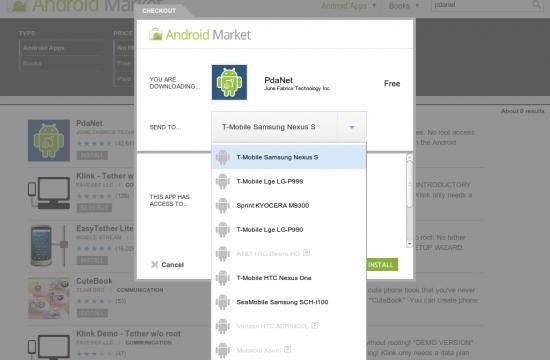
Android’s impossibly fast adoption since its debut isn’t due to just a single feature or element. It’s the concoction that Google created in their popular mobile operating system that has people clamoring to get their hands on it. Consumers and manufacturers have chosen Android and made it one of the most popular platforms available, with no signs of it slowing down any time soon. Not surprising, Android’s openness is one of those features that people enjoy. Additionally, there’s the Android Market: a place where folks can find many apps to help in their day-to-day tasks, without carrier or manufacturer intervention. But it looks like those days are quickly coming to a close, at least for those under AT&T and Verizon’s banner.
It’s no secret that there are applications available in the Android Market (and have been available in other digital application “stores”) that bypass certain carrier restrictions. Namely, and for the specific case of this article, we’re talking about tethering applications. These apps are meant to make it easy for consumers to connect their phone to an external device, like a laptop or gaming console, and use their phone as an access point. Both AT&T and Verizon have tethering plans specifically for these phones, and obviously feel like their plans are good enough for the average user to use.
But, for $20 per month for a limited amount of download, many people aren’t willing to pay that. When you can use popular tethering applications available in the Android Market for free, and utilize your plans unlimited data, why would someone want to pay extra for it? The carriers have caught onto this, with AT&T already pulling the noose tighter around tethering apps. And now Verizon is starting to follow suit.
New reports have broken the surface suggesting that both major carriers are blocking downloads of popular tethering applications from the Android Market altogether. Carrier intervention within the Android Market is something that many people weren’t expecting, even if the carrier’s justification for the motion is probably sound. But, the real question is this: are the carriers in the right for doing this?
If we’re looking at it in a black-and-white kind of way, then yes, the carriers are right. They provide a service and plan for subscribers to their network, specifically tethering, and if a subscriber owns a device that can tether, then they should have to pay for that offered service. But, if we throw a bit of gray into there, then we have to look at the Android mobile OS, and the fact that it’s labeled as an open OS, where users should be able to download available applications and use those applications as they see fit.
But, considering subscribers are locked down by their carrier, that black-and-white perspective is something we’re probably going to have to live with. That is, until developers figure out a way to get their apps onto devices again. Side-loading those same apps is an easy work-around, at least for those on the Verizon network, that is. But, when will AT&T and Verizon simply start charging for excessive usage of data, used by those tethering apps?
I suggest that last part because there has to be a “next step” for these carriers. Simply blocking the direct download of these apps won’t be enough for them, because people will find a way around it. So what’s the next step? What will carriers do to make sure that people pay for what they think subscribers should be paying for? Where’s the line drawn? Let me know what you think in the comments below.